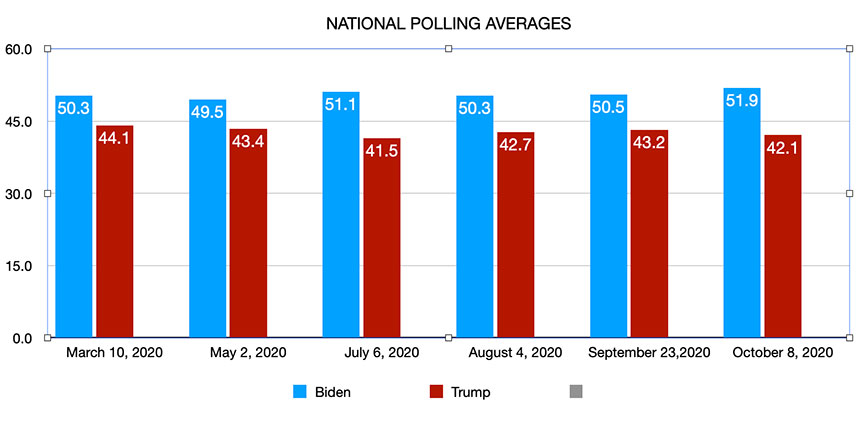The 2020 Elections
Joseph R. Biden, Jr., has been elected 46th President of the United States
Joseph R. Biden, Jr., has been elected 46th President of the United States. Kamala Harris has been elected Vice President. At age 78, Biden is the oldest person to be elected President of America, and Harris is the first woman, and the first person of color elected Vice President.
The 2020 US Presidential election, officially called by the national media on November 7th, four days after the vote, was a rough battle fought in the shadow of the Covid-19 pandemic. Biden received the nomination of the Democratic Party, despite losing primaries in Iowa and New Hampshire. His victory in North Carolina, thanks to the overwhelming support of the African American community, quickly catapulted him to multiple victories in primaries and caucuses on Super Tuesday. Biden's victories then guaranteed him the nomination.
National polls showed Biden to have a consistent lead against President Donald J. Trump, which varied from 4 points to 12 points. Due to the Covid-19 pandemic, the 2020 election was one of the most unconventional in modern American history. Biden did not hold any massive rallies, limiting participation to numbers that would maintain proper social distancing. In contrast, Trump ignored the dangers of widespread contagion, and held many large-scale rallies in the closing two weeks of his campaign.
The candidates participated in two debates. The first debate was a disaster for Trump, who interrupted Biden incessantly. Soon after the first confrontation, Trump was diagnosed with Covid-19. Thanks (most likely to the complement of experimental drugs administered to him), Trump recovered quickly and headed back on the campaign trail within ten days. The second debate, held after Trump's recovery, was considered a closer confrontation. While there was no clear agreed upon victor, a majority of debate watchers seemed to appreciate Biden's call for unity as his closing message.
The Democrats had a financial advantage during the later stages of the campaign, out raising the Republicans by a significant margin. Biden's message was mostly focused on a series of attacks on the Trump administration's mishandling of the COVID-19, combined with a call to work to bring America together. Trump's message was that Biden "would bring the radical left to power", and "America would not be safe with the radicals who want socialism".
Trump's strategy of holding massive rallies appeared effective in getting out his base. However, Trump lost the votes of the suburbs, which have been key to Republican victories in the past decades. Biden was able to mobilize the minority communities in most parts of the US, which propelled him to a surprise victories in both Georgia and Arizona.
Nevertheless, Biden did not do as well as polls had projected. As I write this initial essay (I will update the text before it becomes part of HistoryCentral's permanent historical timeline), it looks like the main reason for Biden's weaker than predicted performance was a stronger than expected turnout for Trump.
One last matter should be noted. Due to the pandemic, most states allowed mail-in voting, many for the first time. Democrats who, by-and-large took the pandemic more seriously than Republicans, chose to vote overwhelmingly by mail. Thus, in states that did not allow mail-in votes to be processed until election day, the initial returns favored Trump; only after mail-in ballots were counted did that change. Therefore, it was not until November 7th, when it became clear Biden had won Pennsylvania (and as a result, more than 270 electoral votes) that networks called the election in favor of Biden.
Second Presidential Debate
Defining deviancy down was my thought as I watched the second and final debate between President Trump and former Vice President Biden. It was a normal debate; Trump acted like a normal candidate. For Trump, who has been President for almost four years, this is considered a win for him. That perception made the debate feel like a draw. However, the first poll results show 53% of those watching thought that Biden won. Only 39% thought that Trump won. It was interesting to listen to a group of undecided voters in North Carolina in a focus group that CNN ran. While they liked some points that each made the non of 12 voters thought that Trump won the debate, nine believed that Biden won, and three thought that neither did. Trump's line that he did more for Blacks than any President with the possible exception of Lincoln, a line that he uses a lot, seems to bother most of those voters. That combined with saying he is the least racist person in the world. Ultimately Biden won the debate because of the fundamental mistake that Trump and the Republican made earlier in the campaign trying to depict Biden as senile suffering from dementia. While Biden stumbled over a few words, a well-known phenomenon that he has suffered from all his life( he suffers from stuttering), what came across was a man who could once again hold his own and in control of the facts. Trump, who is behind in all the polls, needed a big win at the last debate to change the race's direction. He did not get one, and thus the debate can only be considered a loss for him.
Vice Presidential Debate
by Marc Schulman
Vice Presidential debates are rarely important, but this year's debate between Karmala Harris and Vice President Pence seemed different. As the moderator pointed out, whoever wins this election will be the oldest American ever inaugurated to the Presidency. Thus the chances that one of the people on the stage might become President in the next four years is statistically higher than average. However, as the debate ended, one thing was clear, this debate will have little effect on the race. The reasons: both candidates, whether you agreed with then or not, came off as competent, and that was the most crucial part of the evening. The event might have been significant if Harris had come off as incompetent, but that certainly did not happen, just the opposite, she came off as fully ready to do the job, and she did that while smiling and being likable.
Pence had a difficult job; he had to defend an unpopular President and a White House that has become the center of a Covid-19 outbreak. He could not ignore the issue since he has been the head of the COVID 19 task force. Instead, Pence changed the subject by saying that anyone attacking the White House's response attacked the American people's brave response. Pence also ducked how the President was actually going to protect people with pre-existing conditions or respond if the President does not accept the election results. Both candidates avoided answering the question of how they would characterize the US relationship with China, a complicated and challenging subject.
Polls show that Harris won the debate, I am not sure of that characterization, but she clearly did not lose the debate, which in the current state of the election campaign with Biden growing an ever-larger lead, is a win for Biden/ Harris.
The First Debate
by Marc Schulman
On September 30, 2020, the first of three scheduled debates took place between President Trump and Vice President Biden. Going into the debate, Biden had a substantial lead in the polls, and thus Trump needed to have a good debate, and simply said--he did not.
Going into the debate in the past few weeks, Trump and the Republicans have been pushing the line that Biden is cognitively impaired and has dementia. Too late, Trump realized that it might backfire and instead began to claim that Biden was taking memory-enhancing drugs. Well, while it would be hard to say that Biden had a stellar performance, his conduct on the debate stage, however, was solid, and no one watching could believe that he is in any way cognitively impaired. As important, he did not let Trump's goading anger him, and he stayed on message while successfully landing several excellent zingers.
Trump, on the other hand, seemed uncontrollable. He was angry and on the attack all the time. He had no answers for his failure to address COVID 19; instead, he could only say that if Biden were President, the death toll would have been in the millions instead of the 200,000 +. When Biden talked about his son Beau who had served in the military, Trump decided this was the time to attack Biden's other son Hunter. Biden responded by talking directly to the audience at home about the fact that his son had had an addiction problem.
Trump's worst moments other than his overall demeanor and inability to follow the rules were his failure once again to say that he will accept the elections' results, continuing to make claims that mail-in ballots are a source of fraud, and his unwillingness to condemn white Nationalist. He went as far as to say "Proud Boys ( a far-right white supremacist group) stand back and stand by".
At various points, Biden called Trump a clown and the worst President in US history. Biden also called Trump a racist. The best line of the night was when the moderator Chris Wallace was trying to stop Trump from taking over Biden and not following the rules of the debate; Biden quipped, "he never follows the rules." Viewers watching the debate could undoubtedly identify with that.
It is hard to believe that Trump's performance at the debate succeeded in convincing anyone who was not a committed Trump supporter before the debate to support him. Instead, as one female undecided Ohio voter said, "I like some of the things he says, but the way he says them makes it impossible for me to vote for him". The debate will go down in history in two regards. First, the worst debate in US Presidential election history, and second as a missed opportunity for Trump. Trump once again may have impressed his base in this debate with his strongman tactics, but his base is not large enough to reelect him.
Kamala Harris has been chosen as the VP Candidate for the Democratic Party by Joe Biden
The Democratic Primary Campaigns
by Marc Schulman
The race for the 2020 Democratic nomination for President started with the largest field of candidates ever. A total of 29 candidates competed during the process. The initial frontrunner was former Vice President Joe Biden. Biden started with the highest name recognition. The Democratic establishment was expected to support him.
Over the many months before the Iowa caucus, the candidates had 11 debates, the first one taking place on June 26-27, 2019 in two sections due to the large number of candidates, and the final debate taking place on March 15, 2020.
By the time the first Democratic voters actually were able to vote, at the Iowa caucus, the field of candidates was down to seven. They were Joe Biden, Bernie Sanders, Elizabeth Warren, Amy Klobuchar, Pete Buttigieg, Tom Steyer, Michael Bloomberg, and Tulsi Gabbard. In the first caucus, Buttigieg pulled off an upset win, with Bernie Sanders coming in second. In the New Hampshire primary, Sanders, who was from neighboring Vermont, won with Buttigieg coming in second and Klobuchar coming in a close third. At this point, many began to write of Biden, whose campaign was considered lackluster as a serious contender. Biden, on the other hand, had built his entire strategy around South Carolina, a state with a large African American community which he believed better reflected Democratic voters than the nearly all-white, Iowa, and New Hampshire. When Sanders won the Nevada caucus on February 22 by a large margin, he became the clear leading candidate. That all changed on February 29 when Joe Biden's strategy of using South Carolina a firewall, worked and he won an overwhelming victory with 48.6% of the votes in a five-way contest.
Biden's victory in South Carolina resulted in Tom Steyer, Pete Buttigieg, and Amy Klobuchar pulling out of the race. Super Tuesday followed three days later on March 3, and Biden's victory in South Carolina combined with the exits of gave a significant boost to his campaign. Biden was the big winner in Super Tuesday, winning Alabama, Arkansas, Maine, Massachusetts, Minnesota, North Carolina, Oklahoma, Tennessee, Texas, and Virginia. Sanders won California, Colorado, Utah, Vermont. While Michael Bloomberg, the former Mayor of New York, who had spent approximately $1 Billion on his campaign, only won American Samoa.
Immediately following her poor showing on Super Tuesday, Senator Warren exited the race as did Bloomberg.
The pressure was now on Senator Sanders, who a mere week before was leading the race to pull out. Sanders vowed to continue to compete, but Biden won victory after victory winning Idaho, Michigan, Mississippi, Missouri, Washington, followed by Arizona, Florida, Illinois, and finally Wisconsin. Sanders had hoped that he could be considered the winner in the one one on one debate between him and Biden that was held on March 15, but observers gave Biden high marks for his performance in the debate. Sanders' loss in Wisconsin, which he had won in 2016 against Secretary of State Hilary Clinton, convinced him that it was over. That, combined with the emerging Corona pandemic, which made campaigning impossible, forced Sanders to agree to suspend his campaign on April 8, 2020. Former Vice President is now the presumptive Democratic Nominee for President in 2020
CNN Poll January 30, 2020 Poll of polls in percentage
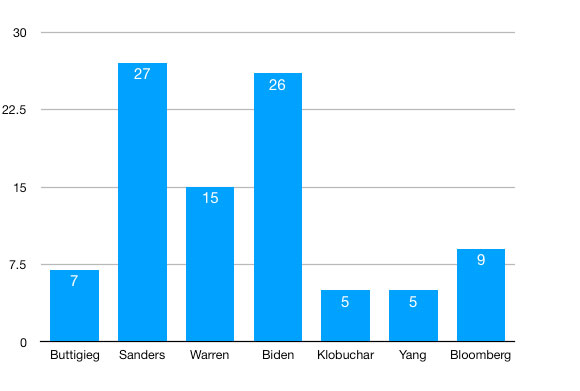
CNN Poll July 1, 2019
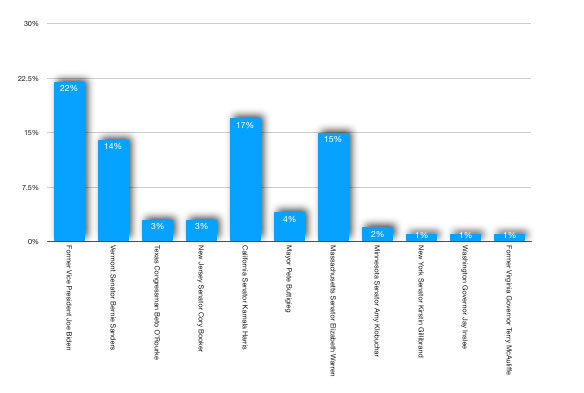
April 30, 2019 CNN Poll
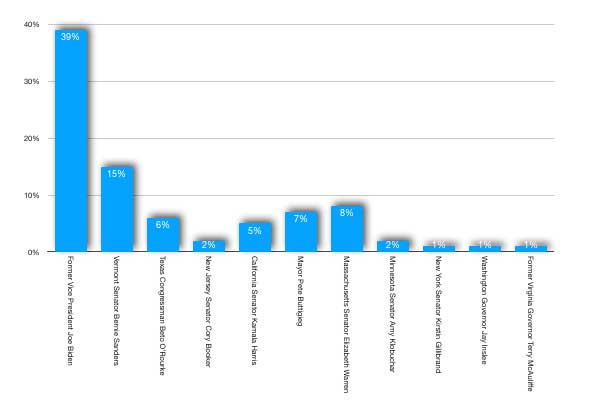
by Marc Schulman
(12.16.2018)Traditionally the next presidential campaign begins the day after the midterms. We are now a month past the midterms, the results in all but one contest are known, and we are weeks away from the next Congress being sworn in. So reluctantly the time has come. I say that with a great deal of reluctance, since for the first time in the over 20 years that I have been editing this website I have not written a summary of the last election. I have felt all along that the definitive story of that election will have to wait until we have all the facts on possible collusion with Russia, and for that, we have to wait for the release of the Mueller report. Hopefully, that will happen in the coming months, and I will be able to put to bed the story of 2016(and release my updated book on Presidential elections). In the meantime, we cannot ignore the story of the 2020 elections.
The assumption at the moment is that President Trump will run for reelection. Whether he faces a primary challenge is an unknown at the moment. Of course, until the full extent of the Mueller investigation and its finding are known any assumption is dangerous.
On the Democratic side there is an unprecedented number of candidates. Below you will find two polls that have been released, on a CNN national poll and the second the first Iowa poll of potential caucuses attendees. These early polls are really about name recognition. The two top contenders in the polls have both run national campaigns and are well known to democratic voters. The third candidate Beto O'Rouke received an inordinate amount of coverage in his run to replace Ted Cruz in Texas. It seems if he had won, he would have become the clear Democratic front-runner, but he lost which should have dented some of the enthusiasm for him.
The conventional wisdom is that there will be a significant fight in the democratic party between the pragmatic politicians and the so-called progressives. I am not convinced. The policy differences between the two groups when it comes to domestic affairs is minimal. The language may differ, with terms like socialism being bandied about, but they have very little connection to real policy differences. Some of the disagreements on foreign affairs may be more substantial, but foreign affairs rarely determine American presidential elections.
We are a little less than 23 months from the next Presidential elections, these past two years have been anything but boring, the following two promise to be riveting.
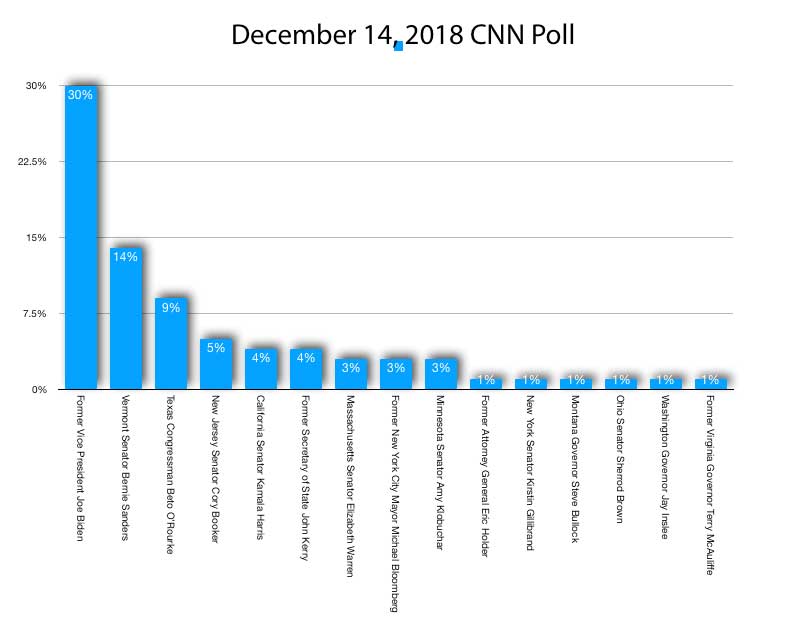
Cnn Poll
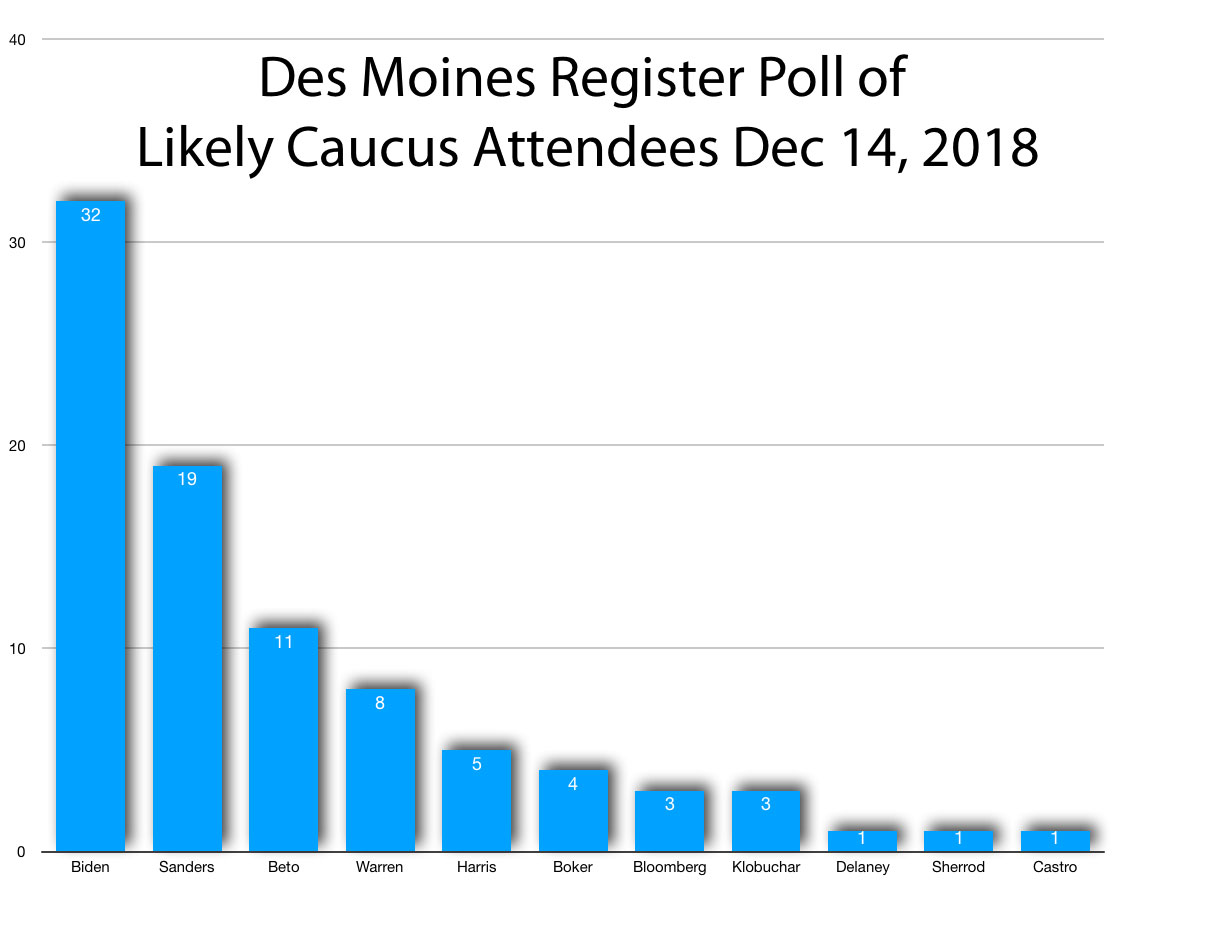
 >
>